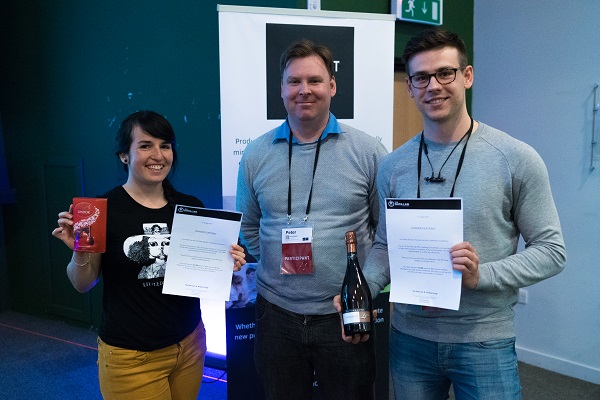An innovative idea from a team of University of Stirling Masters students has won the inaugural Data Lab MSc Challenge Competition.
The competition brought 90 students, funded by The Data Lab’s pioneering MSc programme, from seven Scottish universities together and challenged them to develop new insights, services or products that have a social or economic benefit using datasets unique to Scotland.
Students Cynthia Morel, Peter Henriksen and Robert Hamlet worked with Zero Waste Scotland to analyse data from three local authorities to develop a prototype that will detect, predict and prevent future fly-tipping across Scotland – an issue that is estimated to cost the country £2.5m.
The Challenge culminated with a 48 hour hackathon and judging ceremony, which saw the Stirling students win £3,000 to contribute towards data training and courses in Scotland.
Technical achievement
Students Robert and Peter are on the University’s Big Data course, while Cynthia studies Data Science for Business.
Robert said: “Our project attempted to model fly-tipping in terms of possible contributing factors, such as nearby construction activity and value of scrap metal, to make future predictions about where and when fly-tipping might occur.
“We managed to build a functioning prototype which was a great technical achievement. We also forged a successful collaboration with Jamie Fry of Zero Waste Scotland who was central to helping us secure the data and make the project a success.”
Joshua Ryan-Saha, Skills Lead at The Data Lab, said: “This year’s challenge provided a snapshot of the potential impact data science can have in Scotland if harnessed in the right way. Central to this opportunity are the skills and knowledge to support and exploit the potential for business and Scotland as a whole. But we’ve got a way to go to rebalance the ongoing issue of supply versus demand in skills.
“The judges were impressed by all the teams that sought to address issues ranging from over prescribing of medicine to eco bus routes and pollution hot-spots to encouraging Scottish tourism. The team tipped the balance because their proposition was technically accomplished demonstrating a robustness that can be applied across different councils, ultimately achieving the end goal of delivering social and economic value to Scotland.”
Dr Kevin Swingler, programme director of the MSc in Big Data, added: “It always brings me pleasure to see our students succeed and this was a great achievement. I'm grateful to The Data Lab for running the competition and proud of all the students who took part."
The challenge competition awards come with confirmation that The Data Lab is increasing its MSc programme by 45% from 90 to 130 funded places with support from The European Social Fund and Scottish Funding Council, as part of the Innovation Centre’s commitment to address Scotland’s data skills shortage.
Background information
Media enquiries to Corrie Campbell, Communications Officer, on 01786 466 169, or c.r.campbell@stir.ac.uk
About The Data Lab
The Data Lab is an innovation centre focused on helping Scottish industry to capitalise on a growing market opportunity in data science. Established with an £11.3 million grant from the Scottish Funding Council, The Data Lab enables industry, public sector and world-class university researchers to innovate and develop new data science capabilities in a collaborative environment. Its core mission is to generate significant economic, social and scientific value from data for Scotland.

